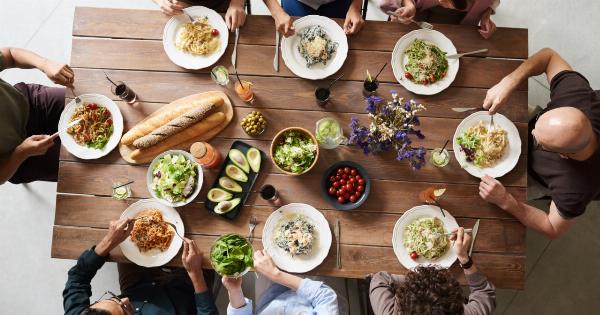As we all know, overeating can lead to various health problems like obesity, heart disease, diabetes, and other chronic illnesses. But eating less doesn’t necessarily mean depriving yourself of your favorite foods or feeling hungry all the time.
By following a few tips and tricks, you can eat less while still feeling satisfied and satisfied. In this article, we will discuss 30 tips to eat less and stay satisfied.
1. Start with a small bowl
The size of your plate or bowl can have a big impact on how much you eat. To reduce the amount of food you consume, start with a smaller bowl. This will help you stick to a smaller serving size while still satisfying your hunger.
2. Use smaller utensils
Just like a smaller dish, using smaller utensils like spoons and forks can help you eat less without feeling deprived. By taking smaller bites, you will eat more slowly, which can also help you feel full faster.
3. Drink water before meals
Drinking a glass of water before meals can help you feel full and satisfied, reducing the amount of food you consume. Plus, staying hydrated can improve digestion and keep you from overeating due to thirst.
4. Chew your food thoroughly
Chewing your food thoroughly can aid in digestion and help you feel full faster. It also gives your brain time to register that you are eating, leading to a greater sense of satisfaction and reducing the likelihood of overeating.
5. Eat slowly
Eating slowly can help you feel full faster and prevent overeating. Take the time to savor your food, and put your utensils down between bites to slow your eating pace.
6. Make half your plate veggies
Vegetables are low in calories and high in fiber, which can help you feel full and satisfied. Aim to make half your plate veggies at every meal to cut down on the calories from other foods.
7. Include protein in every meal
Protein helps you feel full and satisfied while preserving lean muscle mass. Including protein in every meal can help you eat less while still feeling satisfied. Choose lean protein sources like chicken, fish, tofu, or beans.
8. Avoid distractions while eating
Eating while distracted- such as while watching TV or working – can lead to overeating because it’s easy to lose track of how much you’ve consumed.
Instead, make mealtime a focus, sit down at the table, and minimize distractions to help you tune in to your hunger and fullness signals.
9. Don’t skip meals
Skipping meals can lead to overeating later in the day due to extreme hunger. Instead, eat regular, balanced meals throughout the day to keep your hunger in check and prevent overeating.
10. Plan your meals and snacks
Planning your meals and snacks ahead of time can help you make healthier choices and avoid impulse eating. Take the time to plan out your meals and snacks each day, so you always have healthy options on hand.
11. Use a food scale
Using a food scale to measure portions can help you accurately track your calorie intake and avoid overeating. Invest in a high-quality food scale to help you meet your weight loss goals and maintain a healthier diet.
12. Eat mindfully
Eating mindfully means paying close attention to your food, including its taste, texture, and smell. Mindful eating can help you enjoy your food more while also helping you recognize your hunger and fullness cues.
It can also help you avoid overeating due to stress, boredom, or other emotional triggers.
13. Avoid sugary drinks
Sugary drinks like soda, juice, and sweetened coffee drinks are high in calories and can rapidly add up to your daily intake.
Instead, drink water or unsweetened herbal tea, which can help keep you hydrated and satisfied without added sugar or calories.
14. Don’t eat straight from the package
Eating straight from a package or container can make it difficult to track your portion sizes and can lead you to overeat. Instead, portion out your food onto a plate or bowl before eating to avoid overindulging.
15. Experiment with spices and herbs
Spices and herbs can add flavor to your food without adding calories. Experiment with different flavor combinations to keep your meals exciting and satisfying without overeating.
16. Keep healthy snacks on hand
Having healthy snacks on hand like nuts, fruit, or veggies can help you avoid overeating at meals and keep you satisfied in between meals. Be sure to choose snacks that are nutrient-dense and filling to help you stay on track with your goals.
17. Eat off of blue plates
Studies show that blue is a color that can help suppress your appetite. Eating off of blue plates or using blue utensils can help you eat less without feeling deprived or hungry.
18. Focus on fiber
Foods high in fiber like oatmeal, brown rice, or whole-grain bread can help you feel full and satisfied for longer periods. Incorporate more fiber-rich foods into your diet to help reduce overeating.
19. Avoid eating when emotional
Eating due to stress, anxiety, or other emotions can lead to overeating and poor food choices. Find other ways to cope with your emotions than food, such as exercising, meditating, or talking to a friend.
20. Limit your alcohol intake
Alcohol contains empty calories that can quickly add up to your daily intake and lead to overeating. Limit your alcohol intake to one drink per day for women and two drinks per day for men to avoid overindulging.
21. Choose healthy fats
Healthy fats like avocado, nuts, and olive oil can help you feel full and satisfied, reducing the likelihood of overeating. Be sure to choose healthy sources of fat and limit your intake of unhealthy fats like saturated and trans fats.
22. Get enough sleep
Lack of sleep can disrupt your hunger and fullness cues, making it more difficult to recognize how much you’ve eaten. Aim to get at least 7-8 hours of sleep each night to help regulate your appetite and prevent overeating.
23. Use a smaller plate
The size of your plate can impact how much you eat, so using a smaller plate can help reduce your portion sizes without making you feel deprived. Fill up your plate with veggies and healthy protein to feel full and satisfied.
24. Take a break halfway through your meal
Taking a break halfway through your meal can help give your body time to recognize when it’s full and satisfied. Put your utensils down and check-in with your hunger and fullness cues before deciding to eat more.
25. Don’t eat until you’re stuffed
Eating until you’re stuffed can lead to discomfort and poor digestion, so always aim to stop eating when you feel full and satisfied.
Remember, it takes time for your body to register fullness, so don’t rush your meals and tune into your hunger signals.
26. Use the palm portion method
The palm portion method is an easy way to measure portions without needing a food scale. Simply use your palm to measure your protein portions and your fist to measure your vegetable portions.
This simple tool can help you stay on track with your portion sizes and reduce overeating.
27. Keep a food journal
Tracking your food intake can help you recognize patterns of overeating and identify areas for improvement. Keep a food journal to help you stay accountable, track your progress, and make healthier choices.
28. Don’t eat in front of the TV
Like other distractions, eating in front of the TV can lead to overeating and poor food choices. Instead, make mealtime an opportunity to focus on your food and enjoy mindful eating.
29. Don’t compare your plate to others
Comparing your plate to others can make you feel guilty or ashamed, leading you to overeat to make up for perceived shortcomings.
Remember, everyone’s dietary needs are different, so focus on your own portion sizes and find what works best for you.
30. Practice self-compassion
Remember, no one is perfect, and making mistakes is a normal part of the journey to healthier eating habits.
Be kind to yourself, practice self-compassion, and know that every small change you make towards healthier eating habits is progress towards your goals.
Conclusion
By following these tips and tricks, you can eat less and stay satisfied without feeling deprived or hungry. Remember, it’s important to find what works best for you and to be patient with yourself as you develop healthier eating habits.
With time and practice, you can develop a healthier relationship with food and enjoy a balanced, satisfying diet.






























